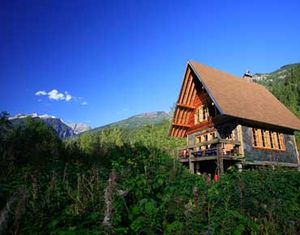
What is an Eco-hostel?[edit | edit source]
An eco-hostel is an inexpensive and sociable accommodation that enables guests to minimize their ecological footprint during their stay. Guests can usually choose between renting a bed in a private room or bunk in a dormitory. Either choice often shares a bathroom, communal lounge, and kitchen. The term is used loosely, as it is currently used as a marketing strategy to create a "Green Image", in hopes that you'll be encouraged to support their business as a part of your green lifestyle.[1]
The purpose of this web page is inform both travelers and businesses on existing eco-friendly technologies and activities currently found at eco-hostels around the world. These technologies and activities can be described as any conscious effort to reduce waste, decrease natural resource and energy consumption, provide community integrated education, and support a healthy lifestyle that is beyond the social norm in that region.
Green Labels & Certifications[edit | edit source]
Green labels and certifications are useful tools consumers can use to make better informed decisions, and are marketing strategies that hostels can use to ultimately increase visitorship. Because "green-washing" (as described in the above section) can be used to misinform customers about the degree of sustainability, labels and certifications are helpful to provide customers with credible information.
Most labels and certifications require baseline criteria to be met, but can be applied for at no extra cost. An example of green key's criteria can be found here.
Other green labels and certifications include:
Why Make a Hostel Eco-Friendly?[edit | edit source]
For starters, you are doing your community (and ultimately the earth) a great service. Other benefits include reduced operating cost and taxes, operating subsidies, and a growing consumer market. In a recent survey, hotel owners ranked reducing operating costs and demands from customers as the top two incentives to undertake environmentally oriented initiatives.[2]
Starting table[edit | edit source]
| Name | Country | Waste* | Waste Policies | Energy* | Energy Policies | Water* | Water Policies | Ed* | Ed Programs | Community Integration* | Green Certifications/Labels | Price** | Other Features |
|---|---|---|---|---|---|---|---|---|---|---|---|---|---|
| EcoHostel Internacional Malargüe | Argentina | 4 | -Environmentally friendly cleaning fluids -Compost |
4 | -Solar and wind energy | N/A | N/A | 5 | -Signs and talks about water and energy consumption -Provide education on farming |
-Offer Bicycles | Choique | $11.50 | -Non-smoking |
| Biolandhaus Arche | Austria | 3 | -Recycle -Use recycled napkins, toilet paper, and envelopes |
4 | -Solar water heating | 4 | -Uses natural spring water | 2 | -Healthy-living library | -Trips to nearby organic farm, natural caves | Bio Hostels, Austrian Eco-Label | $64.00 | -Nature walks |
| Pension Hubertus | Austria | 3 | -Environmentally friendly cleaning fluids | 5 | -100% renewable energy | N/A | N/A | N/A | N/A | -Seasonal products available from local organic gardens | Austrian Eco-Label | $45.00 | -Non-smoking -Public transportation available |
| The Rainbow Hostel | Costa Rica | N/A | N/A | 5 | -100% Solar energy | 5 | -Rain water catchment | 4 | -Workshops | -Peaceful social structure | N/A | $10.00 | -Just love, no violence |
| La Casa Verde | Ecuador | 5 | -Extensive reduce, reuse, recycling system -Septic system |
5 | -Energy from hydro-electric dams -Use FCL bulbs |
N/A | N/A | 5 | -Own eco-policy -Literature on environmental deterioration in Ecuador |
-Work with neighbors in community to be sustainable -Buy local produce |
N/A | $17.00 | -Educational based hostel |
| Hostal Llullu Llama | Ecuador | 3 | -Composting toilets -Compost |
N/A | N/A | N/A | N/A | 5 | -Encourage volunteer projects including educating local primary school | -Volunteer work with community | N/A | $18.00 | N/A |
| Green Elephant Backpackers | South Africa | 3 | -Minimal recycling system -Reduce, reuse, recycle philosophy |
4 | -Solar water heating -Insulation |
4 | -Low flow shower heads -Rainwater catchment |
3 | -Environmental management plan that staff are committed to | -Involved in numerous community program and charity organizations | N/A | $15.50 | -Offer many tips, information, and outsourced tours and activities |
| Centre Ecològic Llémena | Spain | 3 | -Built from sustainable materials |
N/A | N/ A | 2 | -Natural waste water cleaning system -Natural spring water swimming pool |
N/A | N/A | -Shop with organic food and other organic products | N/A | $26.50 | -Mattresses are 100% natural latex, quilts of Merino wool -Yoga and tai-chi classes |
| Backpackers Villa Sonnenhof | Austria | 3 | -Use recycled paper products | 3 | -Solar water heating -Strictly water powered electricity sources |
2 | -Water saving taps | N/A | N/A | -Use and offer local products | N/A | $33.00 | -Easily accessibly by train |
- * Ed=Education; Scale is 0 to 5, with 5 being most eco.
- ** Prices are for dormitory beds (or single beds if were not offered) at low season. Prices were taken in Sept 2010.
- N/A = Information not available through website or contact by e-mail.